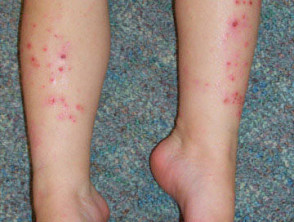
Allergic Reaction To Insect Bite Icd 10 Code. S60562S is a billable diagnosis code used to specify a medical diagnosis of insect bite nonvenomous of left hand sequela. Other insect allergy status 2016 2017 2018 2019 2020 2021 BillableSpecific Code POA Exempt Z91038 is a billablespecific ICD-10-CM code that can be used to indicate a diagnosis for reimbursement purposes. Toxic effect of venomous bite or sting insects ICD-10-CM T63481A is grouped within Diagnostic Related Groups MS-DRG v 380. Urticaria unspecified L50 Excludes1.

ICD-10 Code for Urticaria unspecified. W57 - stinging poisonous insects. The ICD code W57 is used to code Insect bites and stings Insect bites and stings occur when an insect is agitated and seeks to defend itself through its natural defense mechanisms or when an insect seeks to feed off the bitten person. This is the American ICD-10-CM version of Z9103 - other international versions of ICD-10 Z9103 may differ. ICD 10 Insect Bite Allergy Code According to the International Classification of Diseases the effects of arthropod attacks are grouped into the following groups. The ICD-10-CM code W57XXXD might also be used to specify conditions or terms like allergic dermatitis due to bite of ctenocephalides canis animal bite of axilla animal bite of axilla animal bite of back animal bite of back animal bite of ear region etc.
ICD-10 Code for Urticaria unspecified.
The 2021 edition of ICD-10-CM Z91038 became effective on October 1 2020. A corresponding procedure code must accompany a Z code if a procedure is performed. - ICD-10 Data Insect bites not stings rarely cause serious allergic reactions but can cause small itchy lumps to appear on the skin. Convert T63481A to ICD-9-CM. Other insect allergy status 2016 2017 2018 2019 2020 2021 BillableSpecific Code POA Exempt Z91038 is a billablespecific ICD-10-CM code that can be used to indicate a diagnosis for reimbursement purposes. The 2021 edition of ICD-10-CM Z9103 became effective on October 1 2020.